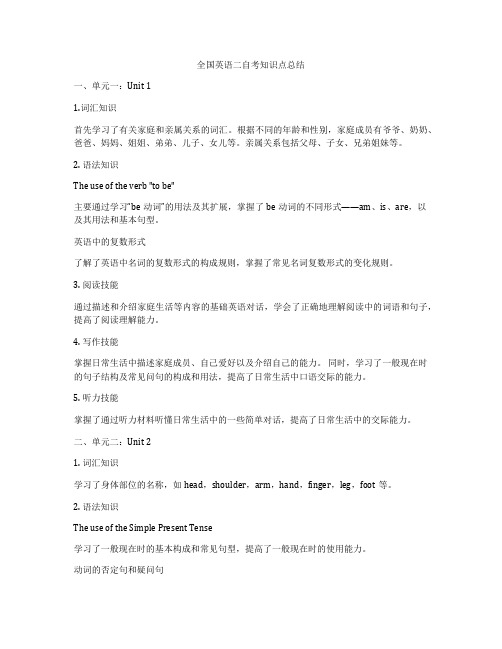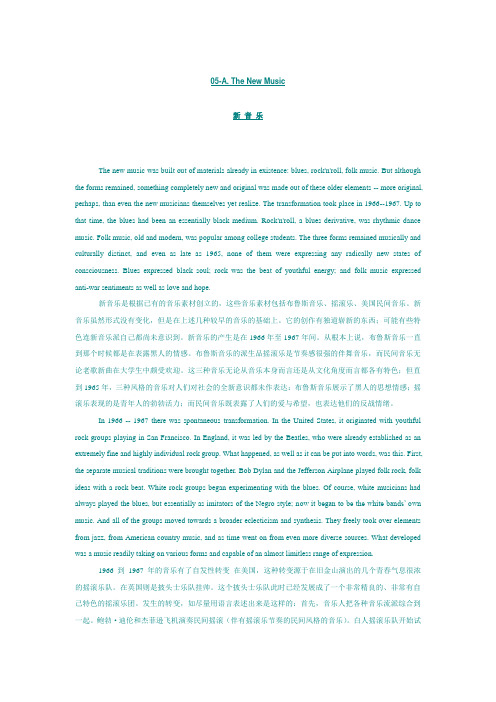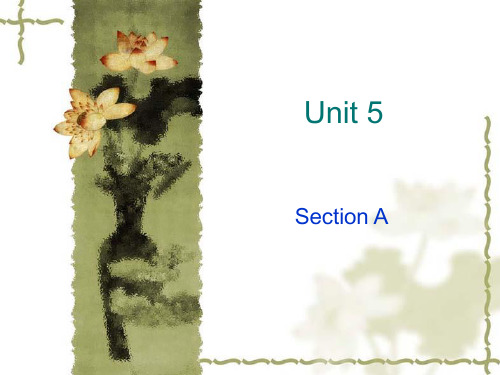自考英语unit5-
- 格式:ppt
- 大小:537.00 KB
- 文档页数:49

全国英语二自考知识点总结一、单元一:Unit 11.词汇知识首先学习了有关家庭和亲属关系的词汇。
根据不同的年龄和性别,家庭成员有爷爷、奶奶、爸爸、妈妈、姐姐、弟弟、儿子、女儿等。
亲属关系包括父母、子女、兄弟姐妹等。
2. 语法知识The use of the verb "to be"主要通过学习“be动词”的用法及其扩展,掌握了be动词的不同形式——am、is、are,以及其用法和基本句型。
英语中的复数形式了解了英语中名词的复数形式的构成规则,掌握了常见名词复数形式的变化规则。
3. 阅读技能通过描述和介绍家庭生活等内容的基础英语对话,学会了正确地理解阅读中的词语和句子,提高了阅读理解能力。
4. 写作技能掌握日常生活中描述家庭成员、自己爱好以及介绍自己的能力。
同时,学习了一般现在时的句子结构及常见问句的构成和用法,提高了日常生活中口语交际的能力。
5. 听力技能掌握了通过听力材料听懂日常生活中的一些简单对话,提高了日常生活中的交际能力。
二、单元二:Unit 21. 词汇知识学习了身体部位的名称,如head,shoulder,arm,hand,finger,leg,foot等。
2. 语法知识The use of the Simple Present Tense学习了一般现在时的基本构成和常见句型,提高了一般现在时的使用能力。
动词的否定句和疑问句掌握了动词的否定形式和疑问形式的基本构成和用法,提高了相关问句句型的灵活运用。
3. 阅读技能阅读理解内容主要涉及描述人体部位的基础知识,通过阅读加深了对这些知识的掌握和理解。
4. 写作技能学习了用英语如何正确描述自己的身体部位和健康状况,提高了描述自己和他人的能力,了解了一般现在时句型的使用。
5. 听力技能掌握了通过听力材料了解日常对话中关于身体部位和健康状况的内容,提高了日常交际和应对紧急情况的能力。
三、单元三:Unit 31. 词汇知识学习了有关学校生活的词汇,包括学校设施、课程安排、学习用品等。

英语本科段自学考试英汉翻译教程U n i t-5--C u l t u r.d o c(总5页)--本页仅作为文档封面,使用时请直接删除即可----内页可以根据需求调整合适字体及大小--Unit 5 CulturLsson 13(E—C)A Valentine to One Who Cared—Too Much(1)By Nancy J. RiggIt’s raining, again. As I lie awake in bed, listening to the sound of those razor-sharp drops pounding on the pavement, my mind goes reeling down dark corridors teeming with agonizing flashbacks, and a chill from within fills me with dread. It’s rainning, again.It does this every year in Southern California; at least that’s what they told me last year when I marveled at the relentless determination of the rain. There seem to be two seasons here. During the rainy season, sometimes the storms drench the area nonstop for days. Sometimes the storm come and go. Often property damage and sirupted livs result. It’s hard to predict the intensity of the patterns from year to year. Then there is the fire season. That takes care of the property that managed to survive the deluge, again disrupting lives. The days connecting thse seasons are monotonous,with some sun, some smog and some more sun. This is nothing like back home in Colorado.We have rains ther, too. Thunderstorms in spring and summer often come with intensity great enough to cause flash-flooding. Every child raised in the West knows about these dangers. At least that’s what I used to think. I’m not so sure anymore. I second grade they showd us a terrifying film about flash-flooding. A man parked his 57 Chevy ona little bridge overlooking a picturesque, arid gully and took outhis camera. It was strating to rain, but he really wanted to get that picture. The image of a sudden wall of dark water carrying the manand his car away in an instant is still imprinted on my mind. They used this kind of scare tactic when I was growing up. I wonder what they use today.A yar ago I would have sworn that children here are taughtnothing about the dangerous powers of nature. My fiance, Earl higgins, and I had recently moved to Los Angeles from colorado. It was a move we had made by choice, for caeer purposes. About a week and a half after we moved into an apartment in Atwater, a block from the Los Angeles River, the rains started in earnest. On Valentine’s Day, I remember thinking what dismal weather it was for being in love, but after studying Earl’s face I knew that the weather didn’t matter much. At least that’s what I thought. Because we were together, lifewas safe and secure. We talked of our plans to wed and start a family, once we were settled in Los Angeles, and we listened to the rain.The Sunnynook footbridge connects Atwater with Griffith Park, spanning the Los Angeles River and the Golden State Freeway. Like the freeway, the river is fenced to keep people out. During several walks to the park, Earl and I had noticed many children who ignord the fences and found holes to allow them through in order to play in the dirt in the river bed and run up and down the sloping concrete banks. Most of the time parents probably have no worry about their kids playing in the concrete channel, because most of the time the riveris dry. Habits form, however, and, in a child’s mind, most of the time becomes all of the time, and nobody gives it much thought. Then the rains come.(to be continued).(from Los Angeles Times)译文:衷肠曲南希·J.里格又下雨了。



05-A. The New Music新音乐The new music was built out of materials already in existence: blues, rock'n'roll, folk music. But although the forms remained, something completely new and original was made out of these older elements -- more original, perhaps, than even the new musicians themselves yet realize. The transformation took place in 1966--1967. Up to that time, the blues had been an essentially black medium. Rock'n'roll, a blues derivative, was rhythmic dance music. Folk music, old and modern, was popular among college students. The three forms remained musically and culturally distinct, and even as late as 1965, none of them were expressing any radically new states of consciousness. Blues expressed black soul; rock was the beat of youthful energy; and folk music expressed anti-war sentiments as well as love and hope.新音乐是根据已有的音乐素材创立的,这些音乐素材包括布鲁斯音乐、摇滚乐、美国民间音乐。

Unit 5 Keeping Your Dreams AliveNew words1. transcend v. 超出,超越(通常的界限)2. incessantly adv. 不停地;持续不断地3. noisily adv. 喧闹地 (noise, noisy)4. subtly adv. 不易察觉地;不明显地;微妙地(subtle)5. enormity n. 巨大;深远影响;严重性 (enormous)6. burden n. (义务、责任等的)重担,负担7. belief n. 相信;信心 (believe, believable, unbelievable, disbelief)8. unique adj. 唯一的;独一无二的;独特的9. affliction n. 折磨;痛苦10. especially adv. 尤其;特别;格外11. tribe n. 部落12. species n. 种,物种(分类上小于属)13. discipline n. 自制力;遵守纪律;磨练14. confront v. 处理,解决(问题或困境)15. evoke v. 引起,唤起(感情、记忆或形象)16. grief n. (尤指因某人去世引起的)悲伤,悲痛,伤心(grieve)17. guilt n. 内疚;悔恨 (guilty, be guilty of, be / feel guilty about)18. anxiety n. 焦虑;忧虑\ (anxious)19. anguish n. 剧痛;极度痛苦;苦恼20. despair n. 绝望21. uncomfortable adj.(使)焦虑的,尴尬的,害怕的,不自在的22. physical adj. 身体的;肉体的;躯体的23. equal v. 比得上;敌得过24. conflict n. 冲突;争执;争论25. engender v. 产生,引起(某种感觉或情况)26. pose v. 造成(威胁、问题等);引起;产生27. distinguish v. 区分;辨别;分清28. wisdom n. 智慧;才智;精明29. mentally adv. 精神上;智力上;思想上30. spiritually adv. 精神上;心灵上31. desire v. 渴望;期望32. deliberately adv. 故意;蓄意;存心33. instruct v. 教授;指导34. dread v. 非常害怕;极为担心Phrases and Expressions1. moan about 抱怨2. a series of 系列;连续3. because of 因为4. as well as 除…之外5. cutting edge (处于某事物发展的)尖端,最前沿,领先阶段6. call forth 引起;使产生Life Is DifficultLife Is Difficult.This is a great truth, one of the greatest truths. It is a great truth because once we truly see this truth we transcend it. Once we truly know that life is difficult--once we truly understand and accept it--then life is no longer difficult. Because once it is accepted, the fact that(引出同位语从句)life is difficult no longer matters.Most people do not fully see this truth that life is difficult.生活是艰难的生活是艰难的。
Unit 5 Keep your Dreams AliveA Famous QuoteYou are never too old to set another goal to dream a new dream.-- C. S. LewisClive Staples Lewis (1898-1963), Irish-born British scholar, writer and lay theologian. He was an established literary figure whose impact is increasingly recognized by scholars and teachers.Text A Life Is DifficultPre-reading Questions:1. Do you believe that life is difficult? What are some of the difficulties that you haveencountered in your life?2. What suggestions did you get from your parents or friends when you met withdifficulties in your life?Life is difficult.This is a great truth, one of the greatest truths. It is a great truth because once we truly see this truth we transcend it. Once we truly know that life is difficult – once we truly understand and accept it – then life is no longer difficult. Because once it is accepted, that fact that life is difficult no longer matters.Most people do not fully see this truth that life is difficult.Instead they moan more or less incessantly, noisily or subtly, about the enormity of their problems, their burdens, and their difficulties as if life were generally easy, as if life should be easy. They voice their belief, noisily or subtly, that their difficulties represent a unique kind of affliction that should not be and that has somehow been especially visited upon them, or else upon their families, their tribe, their class, their nation, their race, or even their species, and not upon others. I know about this moaning because I have done my share.Life is a series of problems. Do we want to moan about them or solve them? Do we want to teach our children to solve them?Discipline is the basic set of tools we require to solve life’s problems. Without discipline we can solve nothing. With only some discipline we can solve only some problems. With total discipline we can solve all problems.What makes life difficult is that the process of confronting and solving problems is a painful one. Problems, depending upon their nature, evoke in us frustration of grief, sadness, loneliness, guilt, regret, anger, fear, anxiety, anguish, or despair. These are uncomfortable feelings, often very uncomfortable, often as painful as any kind of physical pain, sometimes equaling the very worst kind of physical pain. Indeed, it is because of the pain that events or conflicts engender in us all that we can call them problems. And since life poses and endless of problems, life is always difficult and is full of pain as well as joy.Yet it is in this whole process of meeting and solving problems that life has its meaning. Problems are the cutting edge that distinguishes between success and failure. Problems call forth our courage and our wisdom; indeed, they create our courage and our wisdom. It is only because of problems that we grow mentally and spiritually. When we desire to encourage the growth of the human spirit, we challenge and encourage the human capacity to resolve problems, just as in school we deliberately set problems for our children to solve. It is through the pain of confronting and resolving that we learn. As Benjamin Franklin said, “Those things that hurt, instruct.” It is for this reason that wise people learn no to dread but actually to welcome problems and actually to welcome the pain of problems.Text B Begin AgainPre-reading Question:1. If your friends turn to you for advice when they face life’s challenges, what will yousay to them?2. What advice do you expect the author will give to people in difficulties?To begin again means that you won’t g ive up.To begin again means you’re trying.You can either start over and live your life.Or spend the rest of your life slowly dying.It is never the falling that makes us fail.It is never the pain or the crying.You can never fail in life, my friend,Unless you give up trying.– Bob PerksIt seems lately that more and more of my friends are facing some seemingly insurmountable challenges in their lives. A few have lost their jobs and some have failed marriages. All too many have failed marriages. All too many have health issues or are battling cancer.I don’t know if it is desperation that causes them to turn to me for advice or whether they have come to value our friendship. But it is difficult, to say the least, to offer words of hope when all they feel is hopelessness. They expect answers, some magic waving of a wand, or a roadmap to get them back on their feet again.I have often struggled with what to say. Mostly because I have faced many of the same challenges in my own life, I remember how empty I felt after someone cheerfully offered words like, “Keep your chin up!” “Things will get better!” “Hang in there!” “It’s always darkest…,” etc.Yes, even those were quick to quote the Bible to me found me quite unreceptive at the time.Now, as an inspiration writer, being thought of as a resource of hope or a good (or bad) example of what to do in life, I have even more people contacting me.So, what do I say?“What can I do, Bob?” I’ve lost my job. What do you suggest?”“Begin again.”“He walked out on me.My whole world just ended. What should I do?”“Begin again.”“Bob, I know both your on and your wife have cancer. I found out my wife does, too. What did you tell them?”“Begin again.”It almost sounds too simple. I imagine in the darkest hours of one’s l ife, those works would seem useless or uncaring. But it is indeed the answer.All life challenges bring about and ending –and the chance for a beginning. A job prevents and opportunity to start over somewhere else and maybe even in another career.A failed marriage does not mean you are through loving or being loved. It means there are others just like you needing to be loved. Find them.A life-threatening disease does not mean giving up. It means starting a new path to recovery and discovering within yourself the ability to fight back and win.And if you are a person of faith, even death does not mean it’s over. It means, “to begin again.”。
自学考试英语考前重点复习(unit5)Text A Fallacies about Food搭配:1. be eager to do sth./be eager for sth. 渴望做某事/动词词组2. be supposed to do sth. 应该,被认为去做某事;it is supposed that 人们认为3. be supplied to sb. 把某物提供给某人4. substitute A for B 用A来替换B/动词或名词词组5. wash sth. down sth. 用什么来涑下什么/动词词组6. have to do with/have nothing to with/have much to do with与某人或某事有关/无关/很有关语言点:1. 阅读技巧:阅读时间如果很紧张的话,我们可以把两个逗号间的内容省略不看。
2. 使役动词:Eating deer would make them run as fast as the deer. Make后用动词原形;同样make也是可以带宾语补足语的动词,e.g. eating enemies that had show n bravery in battle would make them brave.Think也可以带宾语补足语。
E.g. People thought tomatoes poisonous.3. may have done sth. 表示对过去的推测e.g. He may have cried yesterday. 他昨天有可能哭了。
She may have found a job last week. 她有可能上个星期已经找到工作了。
4. civil(国民的)-civilized(文明的)-civilization(文明)5. it is/was thought that 有人认为6. eat-ate(过去时)7. Later another wrong idea about tomatoes grew up. Tomato的复数形式需要在词末加es.Idea grows up. 出现某种观点。